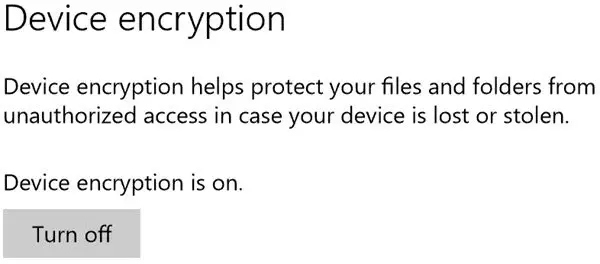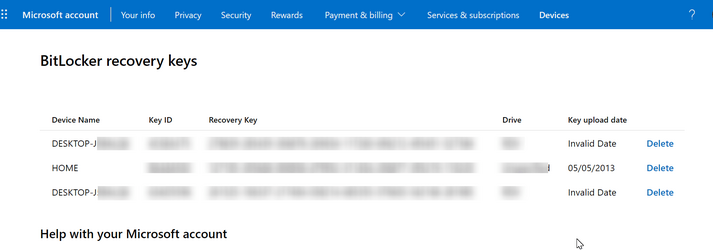- Local time
- 1:34 PM
- Posts
- 244
- Location
- San Juan-Abra, Philippines
- OS
- Windows 11 Home 22H2 build: 22621.1928
My new Vivobook laptop boot drive is encrypted but not protected with a password. I have no security concerns, only use the laptop at home, no one else has access to it. Should I decrypt the drive or just leave it encrypted? Is encrypting slowing down this fast SSD (NVMe Micron_2450_MTFDKBA512TFK)? When I clicked on decrypt, I got a red warning that this may take very long (150GB data) and I read on the website that it may even take days, so I cancelled. I asked ASUS Support why they encrypt drives (factory default) but did not get a reply. All comments appreciated.
My Computers
System One System Two
-
- OS
- Windows 11 Home 22H2 build: 22621.1928
- Computer type
- Laptop
- Manufacturer/Model
- Acer/Aspire5 515-54G-70AG
- CPU
- Intel i7-10510U CPU 1.8 GHZ
- Motherboard
- Intel Comet Lake-U PCH-LP Premium, firmware version 3.2
- Memory
- 8 GB 1333.3 MHz Dual channel
- Graphics Card(s)
- Intel UHD + NVIDIA GeForce MX250
- Sound Card
- RealTek ALC255 chipset
- Monitor(s) Displays
- Full HD TN 16"
- Screen Resolution
- 1920x1080 220 NITS
- Hard Drives
- SATA mechanical 1TB TOSHIBA HDWL110 X1UGPHELT 5600 rpm
- PSU
- Murata battery AP18C4k (31CP5/81/68) Li-Polymer Battery Pack, full capacity 46620 mWh 11.4V
- Case
- Polycarbonate with a metal panel lid
- Cooling
- 1 fan
- Keyboard
- US
- Mouse
- Precision Trackpad
- Internet Speed
- 15 mb/s
- Browser
- Edge
- Antivirus
- Windows Defender
- Other Info
- 2022 Intel diplay driver: gfx_win_101.3413_101.2111.exe
-
- Operating System
- Windows 11 Home 23H2 build 22631.3527
- Computer type
- Laptop
- Manufacturer/Model
- Asus Vivobook K3502Z S15 15" OLED
- CPU
- Intel 12th Gen. i7 12700H, 14 cores, 2.3 GHz (24M Cache, up to 4.7 GHz, 6P+8E cores)
- Motherboard
- Alder Lake-H, 1700-4700 MHz clock rate
- Memory
- 8GB LPDDR4 on board + 8GB LPDDR4 3200 MHz in Dual Channel.
- Graphics card(s)
- Intel Iris Xe supports up to 4096 x 2304 @ 120Hz
- Sound Card
- Harman Kardon - DTS
- Monitor(s) Displays
- OLED 15.6inch 2.8K (2880 x 1620)
- Screen Resolution
- 16:9 aspect ratio 0.2ms response time 120Hz refresh rate, 550nits
- Hard Drives
- 512GB M.2 NVMe Gen4 PCIe 4.0 SSD, Micron_2450_MTFDKBA512TFK
- PSU
- 90-Watt USB charger (Thunderbolt4)
- Case
- Metal lid, plastic case
- Cooling
- 1 fan
- Mouse
- Precision Trackpad
- Keyboard
- With backlight
- Internet Speed
- ISP provides 15 mb/s WIFI LTE (4G), laptop WIFI 6 adapter.
- Browser
- Edge
- Antivirus
- Windows Defender
- Other Info
- BIOS American Megatrends International, LLC. K3502ZA.307, 08/09/2022. Network adapter: Intel Wi-Fi 6E AX211 160 MHz




















